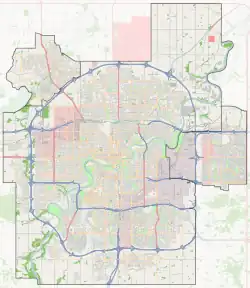Horse Hill, Edmonton
Horse Hill is a residential area in the northeast portion of the City of Edmonton in Alberta, Canada. It was formally established on May 22, 2013 through Edmonton City Council's adoption of the Horse Hill Area Structure Plan, which guides the overall development of the area.[2] The area is estimated to have a population of 71,467 at full build-out of five neighbourhoods.[2]
Horse Hill | |
|---|---|
Area | |
 Horse Hill Location of Horse Hill in Edmonton | |
| Coordinates: 53.650°N 113.332°W | |
| Country | |
| Province | |
| City | Edmonton |
| Quadrant[1] | NW/NE |
| Ward[1] | Dene |
| Established[2] | May 22, 2013 |
| Government | |
| • Administrative body | Edmonton City Council |
| • Councillor | Aaron Paquette |
| Elevation | 655 m (2,149 ft) |
The community is represented by the Horse Hill Community League, established in 1972.[4][5]
Geography
Located in northeast Edmonton, Horse Hill is bounded by Manning Drive (Highway 15) to the northwest, Anthony Henday Drive (Highway 216) to the southwest, the North Saskatchewan River valley to the south and east, and 33 Street NE to the northeast.[2]
The Edmonton Energy and Technology Park, part of Alberta's Industrial Heartland, is located beyond Manning Drive to the northwest, while the Pilot Sound and Clareview areas are located beyond Anthony Henday Drive to the southeast. Edmonton's Clover Bar area is located across the North Saskatchewan River valley to the south, while Strathcona County and the City of Fort Saskatchewan is across the river valley to the east and northeast respectively. Sturgeon County is located beyond 33 Street NE to the northeast.
History
Horse Hill got its name from its use as a guarded horse pasturage for horses belonging to nearby Fort Edmonton in the early 1800s. The name "Horse Hill" first appears in the Edmonton House Journal on December 28, 1825. The "horse guard" lived in tents on the site and tried to safeguard the fort's horses from being stolen by Natives.[6]
By 1880s, it was more or less settled as farmland. It was within the Horse Hill School District and the County of Sturgeon prior to 1982 when it was annexed by the City of Edmonton.[7]
In 1987, the Edmonton tornado whipped through the area, especially damaging to the Evergreen mobile home community within.
Neighbourhoods
The Horse Hill area was planned to be developed into five neighbourhoods, with estimated full build-out populations ranging from 4,718 to 27,242.[2] In 2021, An amendment to the Horse Hill ASP was approved to divide Neighbourhood 1 into two separate neigbourhoods.[8] The Evergreen neighbourhood, a manufactured home community is located within future Horse Hill Neighbourhood 1B and Quarry Ridge, an estate residential subdivision, is located within Horse Hill Neighbourhood 1A.[2] Today, the Horse Hill Area includes the following:
- Marquis
- Horse Hill Neighbourhood 1A
Land-use plans
In addition to Horse Hill Area Structure Plan, the following plans were adopted to further guide development of certain portions of the Horse Hill area:
Surrounding areas
References
- "City of Edmonton Wards & Standard Neighbourhoods" (PDF). City of Edmonton. Retrieved February 13, 2013.
- "Horse Hill Area Structure Plan (Office Consolidation)" (PDF) (PDF). City of Edmonton. July 2013. Retrieved December 21, 2014.
- "City Councillors". City of Edmonton. Retrieved February 13, 2013.
- "Horse Hill Community League". Horse Hill Community League. Retrieved October 9, 2017.
- Kuban, Ron (2005). Edmonton's Urban Villages: The Community League Movement. University of Alberta Press. ISBN 9781459303249.
- Binnema and Enns, Edmonton House Journal 1821-1826
- Baergen, Pioneering with a Piece of Chalk
- "Horse Hill Neighbourhood 1A Neighbourhood Structure Plan". www.edmonton.ca. Retrieved 2023-05-06.
- Marquis Neighbourhood Structure Plan (Office Consolidation) (PDF). City of Edmonton. April 2015. Retrieved May 5, 2023.
- Horse Hill Neighbourhood 1A Neighbourhood Structure Plan (Office Consolidation) (PDF). City of Edmonton. August 2021. Retrieved May 5, 2023.